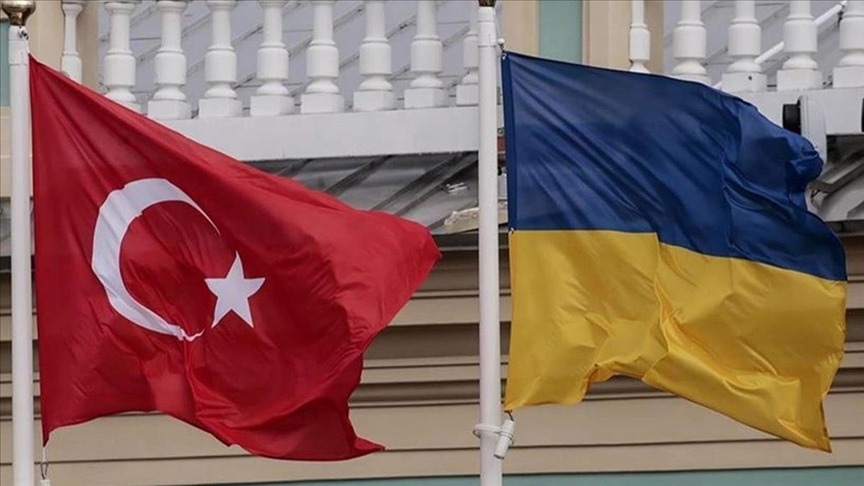Ülviye FİLİYEVA ERKEÇ
Today, the shifting center of the economy to Asia and the developing cooperation in the geography of the Turkish world, located between Europe and Asia, provide important opportunities to the participating countries. The request to join the organization, which was founded in 2009 in Nakhchivan by Turkey, Azerbaijan, Kazakhstan and Kyrgyzstan, expanded with the participation of Hungary in 2017 and Uzbekistan in 2018, and whose new name is the Organization of Turkish States, is voiced by Ukraine this time. The Ukrainian authorities express their beliefs that they have special ties with the Turkic
In this context, The International Asia Today presents the views of Orientalist Yaroslav Pilipchuk, Doctor of Historical Sciences, in the context of Ukraine’s historical ties with the Turkic World, ideas for joining the Organization of Turkic States, and searches for regional cooperation.

Doctor of Historical Sciences, Orientalist, lecturer at the M.P.Dragomanov National Pedagogical University of Ukraine
Mr. Pilipchuk, the Republic of Hungary joined the Turkic Council in 2018 as an observer member. So, how do you evaluate the initiative of Ukraine to join the organization as an observer member?
Yes, Turanism is very popular among Hungarian people. Hungarian people consider Huns as their ancestors rather than Ugrians. There are also some parallels between the pre-Christian beliefs of the Hungarians and the pre-Muslim beliefs of the Turks. Recently, Ukraine has expressed its desire to join TURKSOY. Since Ukraine is the homeland of the Turkic peoples Gagauz, Karay and Crimean Tatars, it should be a member of these organizations. Besides, Azerbaijan and Turkey are friendly nations to Ukraine in a traditional way. The participation of Ukraine in Organizations of Turkish States as an observer will create an opportunity for Ukraine to interact more actively with Turkey. Ukraine should participate in the Turkic Council and support the integration of Central Asian states to the Turkish World along with Turkey.
Well then, how do you evaluate Ukraine’s relations with Central Asian countries?
Ukraine possesses a different kind of relationship with each of Central Asian countries. For example; the state, which has no relations with Tajikistan, has weak relations with Kazakhstan and Kyrgyzstan. Actually, states that integrate with Russia are forced to treat us coldly. Many relations with these countries are maintained by the personal contacts of diplomats, cultural and scientists. Many ordinary Kazakhs support Ukraine. Along with this, we have had relations with Uzbekistan and Turkmenistan at the institutional level since the 90s. Former President of Uzbekistan Islam Karimov supported the attempts of former President of Georgia Eduard Shevardnadze and former President of Ukraine Leonid Kuchma to create the GUUAM organization as a counterbalance to Russia. President Viktor Yanukovych, who carried out a policy towards Russia in 2010, took the initiative to dissolve the organization as soon as he came to power. In 2014, Yanukovych’s government was overthrown, but meanwhile, the Russo-Ukrainian war and European integration events in Donbas severely alienated Ukraine from Central Asia. Under current President Volodymyr Zelensky’s administration, we are witnessing the re-establishment of ties with Uzbekistan and Turkmenistan, in addition to European integration. It is easier to restore relations with the Uzbeks, since the President of Uzbekistan, Shavkat Mirziyoyev, has the image of a reformist and liberal leader. Turkmenistan displays a neutral stance and it is important for us that Turkmen do not side with Russia on the Crimea issue. The Turkmen Cultural Center, named after the Turkmen poet Mahtumkulu Firaki, operates in Kiev, Ukraine. The number of Kyrgyz and Kazakhs living in Ukraine is much less than the Turkmen, Uzbek and Tajik communities. Kyrgyzstan, on the other hand, is a democratic country, although geographically far from us, and is similar to Ukraine in many ways.
You said that Ukraine and the Turkish world are connected by a historical bond. As a historian, can you talk about our common history from past to present?
Yes, there are deep-rooted bonds between Ukraine and the Turkish World. About half of the territory of Ukraine is the steppe. Historically, Slavs and Turks have been in close interaction. Kievan Rus was ally of Oghuz Turks against Volga Bulgars and Pechenegs. In the 17th century, the Crimean Tatars sided with the Ukrainians in the Ukrainian people’s national liberation war and formed alliances with some Ukrainian Hetmans, Crimean khans and Ottoman sultans. The Ottomans supported Ukrainian Hetman Petro Doroshenko and Yuri Khmelnitsky. Rather like the Soviet historians tried to show that the Zaporozhian Cossacks were not open enemies of the Muslims. After the Russian Empress Yekaterina Zaporojian defeated Sich, some of the Zaporozhian people moved to the Danube delta, which was an Ottoman territory, and lived there until 1829.
China’s “Belt and Road” initiative has an important place in the Asia-Europe line. In Ukraine, the idea of joining the project with a new corridor is being voiced. Do you think this option will interest China?
In Ukraine, the following idea is expressed: Chinese goods should reach Azerbaijan-Georgia via Iran and be transported through a corridor to be opened to Ukraine through the ports of this country. In this case, Chinese export goods can travel from China to European countries via Pakistan, Afghanistan, Iran, Turkey and Ukraine; in addition, vice versa, German equipment, Iranian oil, Ukrainian ore and grain, Afghan copper and rare metals can be transported. However, many things in this Project are connected to the relations between China and Russia. I think Ukraine is not in the first place in China’s plans. Besides, China is actually a rival to the USA which is one of the main allies of Ukraine. For me, a new branch of the “Belt and Road” Project is not possible. In fact, the constitution of such a branch is going to prevent our integration with the USA, Europe and Turkey. It is hard to make estimations on such an issue.
An interview on our website is the personal opinion of expert and may not reflect the editorial view of The International Asia Today.

